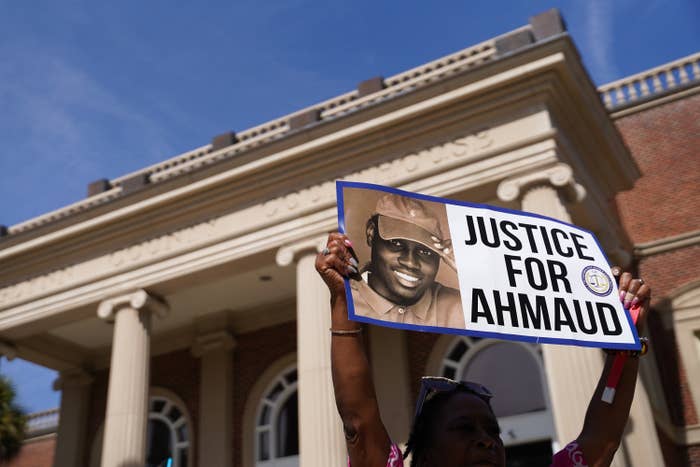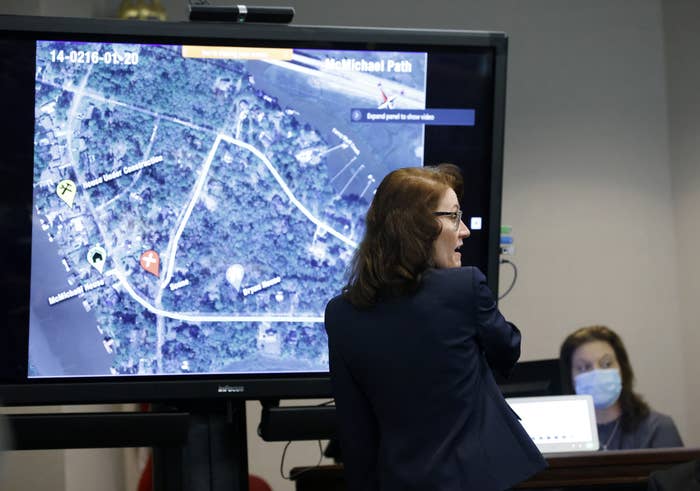
In a lengthy opening statement that marked the start of the trial of the three men accused of killing Ahmaud Arbery, prosecutors repeatedly returned to the argument that he was killed on Feb. 23, 2020, because the men had taken actions based on their assumptions about him.
"All three of these defendants did everything they did based on assumptions," Cobb County Senior Assistant District Attorney Linda Dunikoski told jurors Friday. "Not on facts, not on evidence. On assumptions. And they made decisions … based on those assumptions that took a young man’s life."
Gregory McMichael, his son Travis McMichael, and their neighbor William Bryan Jr. face charges of malice and felony murder, aggravated assault, false imprisonment, and criminal attempt to commit a felony.
All three have pleaded not guilty. The McMichaels claim they were attempting to make a lawful citizen's arrest and acted in self-defense, while Bryan, who joined in on the chase and filmed the shooting, claims he had no part in the killing.
Arbery's death, which his family has called a modern-day lynching, sparked protests across the country that subsequently fueled an international reckoning over race and police violence. Video of the incident shows the 25-year-old jogging down the street toward a pickup truck as the McMichaels look on, and one of them — Travis — holding up a shotgun aimed at Arbery.
Prosecutors laid out a detailed sequence of the events that led to his death, as well as the backdrop against which the accused's encounter with Arbery happened, involving surveillance video showing him walking around in a home under construction in the Satilla Shores neighborhood.
Dunikoski meticulously mapped out the three men's actions against Arbery that day, including that the McMichaels tried to hit him four times with their white pickup truck, and Bryan attempted to run him into a ditch.
"The defendants assumed the worst about Ahmaud Arbery," she said. "The McMichaels sought to confront Arbery, and took their guns with them to do it. ... All three trapped him like a rat between their two pickup trucks."
At one point during her opening statement, Dunikoski played a video of the moment Arbery was shot and killed to the nearly all-white jury. Reporters in the room said Arbery's mother, Wanda Cooper-Jones, was heard crying in the courtroom, and that his father got up and left before returning later.
Tasked with proving that the defendants showed malice in Arbery's killing, Dunikoski emphasized the felony charges in her statement. The three men violated Arbery's personal liberty that day, she argued, "before he finally tried to run around their truck and get away from these strangers who had already told him they would kill him. And then they killed him."

Just hours into the trial Friday, Judge Timothy Walmsley declined to grant a mistrial after the defense took issue with Dunikoski mentioning the time lapse between Arbery's death and the defendants' arrests in her opening statement. Walmsley previously ruled that the period during which the investigation into the shooting stalled should not be brought up in the trial.
Defense attorneys for the McMichaels struck a similar tone in their opening statements: that the father and son were acting in self-defense to protect themselves and their neighborhood.
Robert Rubin, who represents Travis McMichael, said his client had seen Arbery in the neighborhood before and believed he was a burglar. Days prior, he added, Travis also saw Arbery reach into his pocket as if he had a gun and therefore believed that he was armed during their encounter on Feb. 23. (Arbery was not armed.)
Bryan's attorney, Kevin Gough, asked the judge to defer his opening statement until after the state presents its evidence. The judge appeared surprised by the request but ultimately granted it.
The first witness called to the stand was William Duggan, an officer with the Glynn County Police Department. The second officer at the scene, Duggan's bodycam recording — which showed Arbery face down in the middle of the street, his partially obscured torso covered in blood — was presented as evidence and played in the courtroom Friday.
